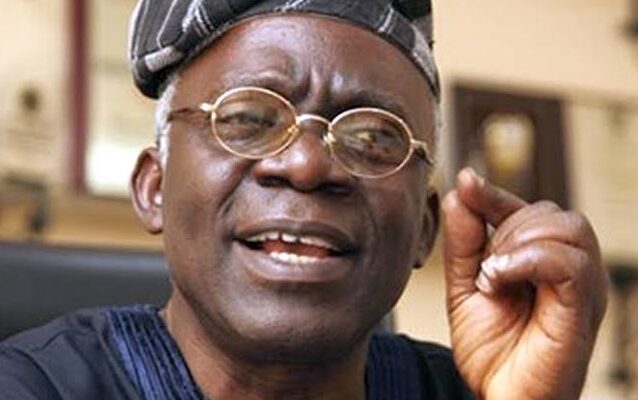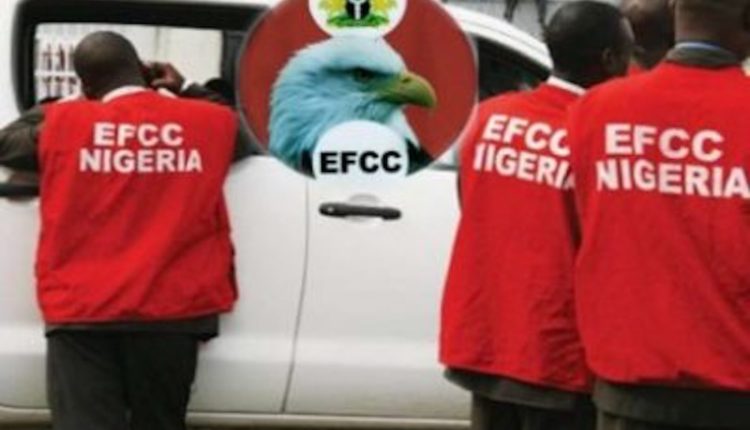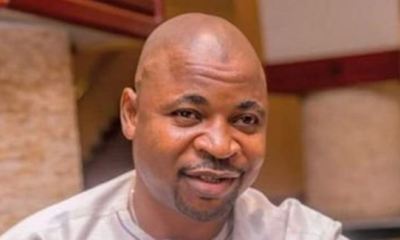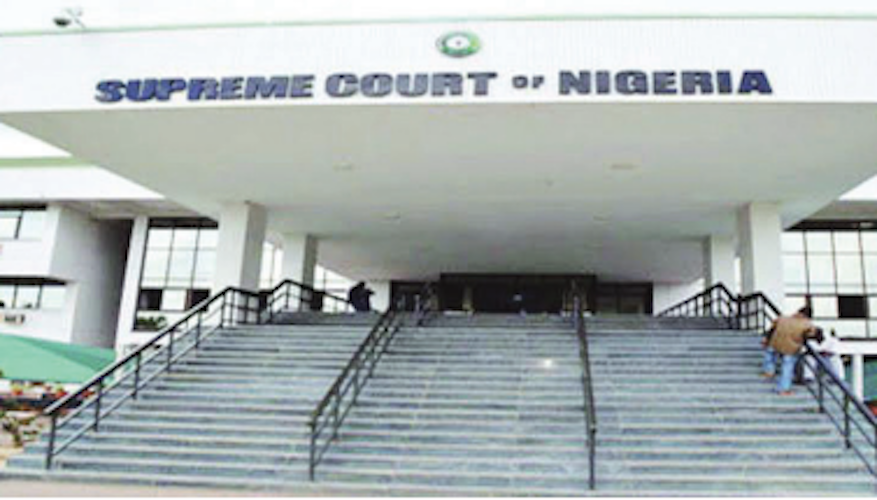Law
Femi Falana asks IGP, INEC Chairman, to probe alleged electoral malfeasance by Adavi LG Chair

Femi Falana (SAN) has written to the Inspector General of Police, Mohammed Adamu, and the Chairman of Independent National Electoral Commission (INEC), Prof. Mahmood Yakubu to investigate the alleged electoral offenses committed by Adavi Local Government Chairman, Hon. Joseph Omuya Salami.
The Human Rights lawyer and Senior Advocate of Nigeria, Falana on behalf of the Kogi Central Peoples Democratic Party (PDP) senatorial candidate, Barr. Natasha Akpoti-Uduaghan,
writes the IGP and INEC calling for investigation into the action of the Adavi local government chairman who was caught on camera destroying electoral materials, and intimidating voters during the just concluded National Assembly and presidential elections.
The letter noted that Hon. Joseph Omuya Salami, in the company of his police escorts, was going around destroying ballot boxes that were already thumb printed by voters in favor of the PDP senatorial candidate in various polling units in Adavi LGA.
Falana argued that the action contravene sections 115(1) (f) & (j), 125 and 126(1) (j) of the Electoral Act, 2022 which are punishable under section 125, 126(3) (4) of the Electoral Act 2022.
The letter reads:
“We are a Solicitors to Mrs. Natasha Hadiza Akpoti-Uduaghan (hereinafter referred to as “our client”).
Our client was the candidate of the Peoples Democratic Party (PDP) vying for the position of Senate to represent Kogi Central Senatorial District at the National Assembly general election of 25th February’s 2023.
“Between 12 noon and 2pm while voting and collation of results was ongoing on the 25th February, 2023, several of our client’s polling agents in Adavi Local Government Area of Kogi State reported to our client that the Chairman of Adavi Local Government Area, Kogi State, Hon. Joseph Omuya Salami in the company of his police escorts were going around destroying ballot boxes that were already thumb printed by voters in favour of our client at the various polling units.
“Our client’s agents were able to capture on camara the criminal activities perpetrated by Hon. Salami at polling unit with Code 034, along Eid Prayer Ground, Nagazi/Farm Centre Ward and Polling Unit 033 Mikab Model School, Nagazi/Farm center ward, Adavi Local Government Area, Kogi State where he was destroying polling materials, ballot papers, intimidating voters and harassing electoral officials with the aid of police officers and thugs.
“He went to other polling units where he tore ballot papers already thumb-printed in favor of our client to reduce her wild margin against the candidate of the APC.
“There is no doubt that the unwholesome activities of Hon. Joseph Omuya Salami, the Chairman of Adavi L.G.A. constitute very grave offences under the Electoral Act, 2022.
“Hence, it is our client’s instruction to request you to use your good office to investigate the said offences which contravene sections 115(1) (f) & (j), 125 and 126(1) (j) of the Electoral Act, 2022 which are punishable under section 125, 126(3) (4) of the Electoral Act 2022”, the letter added.
Law
EFCC Grants Bail to Two Kogi Officials, wants Yahaya Bello’s Fraud Case adjurned

The Economic and Financial Crimes Commission (EFCC) has granted administrative bail to two co-defendants, Umar Oricha and Abdulsalami Hudu, in a fraud case involving former Kogi State Governor, Yahaya Bello. The case, centered on charges of fraud totaling N101.4 billion, has been adjourned until November 27, 2024, by the Federal High Court in Abuja.
At the hearing before Justice Maryann Anenih, EFCC Counsel Jamiu Agoro requested an adjournment, noting that the 30-day compliance period for Bello’s summons, issued on October 3, had not yet expired. Agoro explained that the November 20 court date was inconvenient for the prosecution, and that seeking an arrest warrant would be premature as Bello still had a few days to respond to the summons.
Both the second and third defendants’ legal representatives supported the adjournment request.
Following this, Justice Anenih approved the EFCC’s request, extending the deadline for Bello’s appearance and authorizing service of the hearing notice to be sent to his last known address.
In a parallel development, the Federal Capital Territory (FCT) High Court in Maitama ordered a hearing notice to be posted at Bello’s residence on Benghazi Street, Wuse Zone 4, Abuja, and on the court’s notice board.
This step follows multiple missed court appearances by Bello since the public summons was issued, urging him to appear for arraignment on 16 counts related to the alleged fraud.
Justice Anenih emphasized the importance of due process, setting November 27, 2024, as the final date for Bello’s court appearance. This case has drawn attention to the EFCC’s efforts to enforce accountability among high-profile figures in Nigeria amidst allegations of large-scale financial mismanagement.
Law
Appeal Court Sacks MC Oluomo as NURTW National President, Reaffirms Baruwa’s Leadership

In a significant development, the Court of Appeal has annulled the appointment of Musiliu Akinsanya, popularly known as MC Oluomo, as the National President of the National Union of Road Transport Workers (NURTW).
The ruling upheld a previous ruling by the National Industrial Court, which had already recognized Tajudeen Baruwa as the rightful leader of the union.
The legal dispute surrounding the NURTW’s leadership has been ongoing, with tensions escalating within the organization.
Despite the court’s ruling in favor of Baruwa, MC Oluomo was recently elected by the Southwest Zone of the union during the Quadrennial Delegate Conference held last week in Osogbo, Osun State.
This election took place amid growing concerns and disputes within the union’s regional factions.
The Appeal Court’s decision is expected to settle the leadership question, restoring Tajudeen Baruwa’s position as the legitimate National President of the NURTW.
However, the union faces potential challenges in maintaining unity across its various regional branches, as supporters of MC Oluomo continue to advocate for his leadership.
This ruling marks a pivotal moment for the NURTW, as it works to stabilize its governance and address internal divisions that have led to several controversies and disputes over recent years.
Law
Supreme Court Rejects States’ Legal Challenge to EFCC’s Constitutionality

The Supreme Court of Nigeria has thrown out a lawsuit brought by several state Attorneys General challenging the constitutional validity of the Economic and Financial Crimes Commission (EFCC). The case, led by Kogi State, questioned the EFCC Act, arguing that it bypassed constitutional requirements regarding international treaties.
The seven-member panel, headed by Justice Uwani Abba-Aji, ruled unanimously to reject the lawsuit, deeming it without merit. Kogi State’s counsel, Mohammed Abdulwahab, SAN, argued that the EFCC Act’s incorporation of the United Nations Convention Against Corruption was unconstitutional, as the law had not received approval from a majority of state Houses of Assembly, as required by Section 12 of the 1999 Constitution. This, he claimed, invalidated the EFCC Act and similar anti-corruption laws.
The plaintiffs also contended that the EFCC and NFIU lacked the authority to investigate state or local government funds, accusing the agencies of encroaching on state powers. Abdulwahab sought a court ruling to nullify the creation of these agencies, arguing it would prevent a potential constitutional crisis.
Attorney General of the Federation, Lateef Fagbemi, SAN, defended the EFCC, asserting that dismantling Nigeria’s anti-corruption agencies would harm the nation’s efforts to combat financial crimes. He argued that the National Assembly has the authority to create laws applicable nationwide to address corruption.
The court ultimately upheld the EFCC Act, ruling that the National Assembly’s legislative powers on corruption are valid and enforceable across all states. Justice Abba-Aji noted that Kogi’s revelations about state officials being investigated exposed ulterior motives behind the lawsuit, describing it as an attempt to shield certain officials.
“No state has the right to enact laws that contradict the statutes passed by the National Assembly,” Justice Abba-Aji said, delivering the judgment. The court dismissed the suit in its entirety, reaffirming that the EFCC Act and other federal anti-corruption laws remain constitutional and enforceable across Nigeria.
-

 Crime1 year ago
Crime1 year agoPolice nabs Killer of Varsity Lecturer in Niger
-

 News10 months ago
News10 months agoFCT-IRS tells socialite Aisha Achimugu not to forget to file her annual returns
-

 Appointment1 year ago
Appointment1 year agoTinubu names El-Rufai, Tope Fasua, others in New appointments
-

 News From Kogi1 year ago
News From Kogi1 year agoINEC cancells election in 67 polling units in Ogori-Magongo in Kogi
-

 News From Kogi1 year ago
News From Kogi1 year agoEchocho Challenges Tribunal Judgment ordering rerun in 94 polling units
-

 News1 year ago
News1 year agoIPOB: Simon Ekpa gives reason for seperatists clamour for Biafra
-

 Metro8 months ago
Metro8 months ago‘Listing Simon Ekpa among wanted persons by Nigeria military is rascality, intimidation’
-

 News10 months ago
News10 months agoKingmakers of Igu/ Koton-Karfe dare Bello, urge him to reverse deposition of Ohimege-Igu
